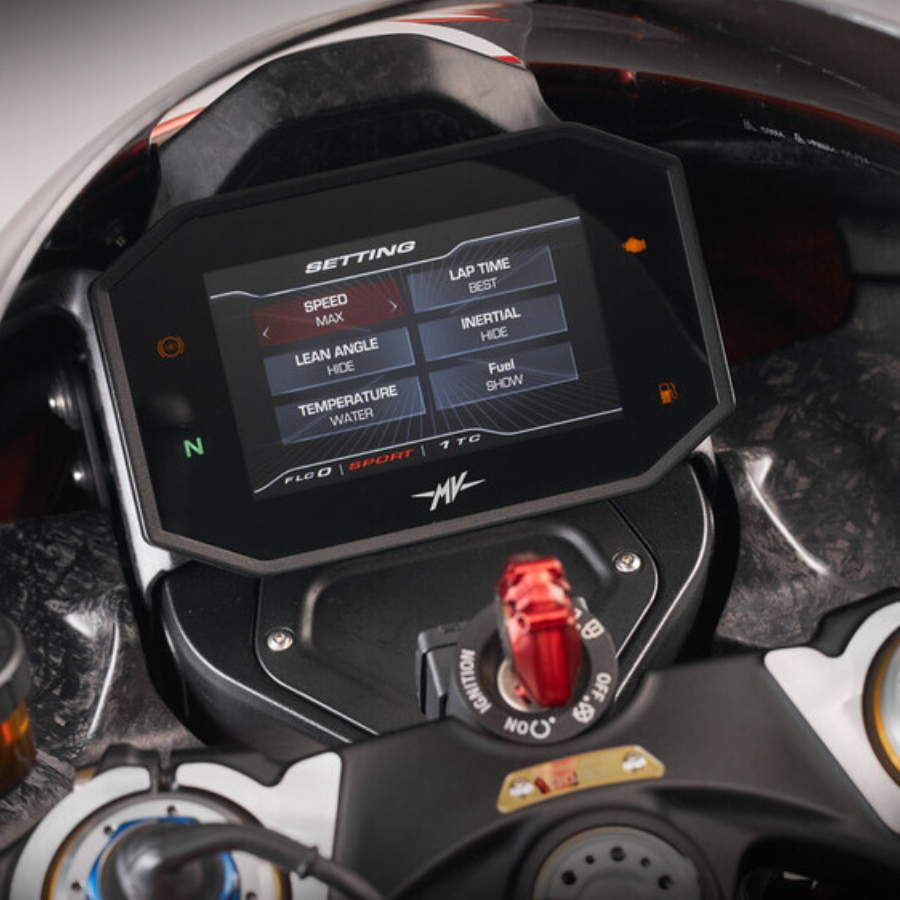KTM 1290 Super Duke R (2020) Review
The latest generation KTM 1290 Super Duke R naked receives a timely tune up to keep the flagship sharp in an increasingly competitive marketplace

The Super Duke has long stood for naked-bike performance and aggression, stretching back past the first 1290 “Beast” of 2014 all the way to 2005, when the original 990 Super Duke rampaged onto the scene with its front wheel in the air.
A string of updates has kept the KTM competitive since then but, with rivals including Aprilia’s Tuono V4 1100 joined by Ducati’s new Streetfighter V4 and Kawasaki’s Z H2 this year, the hyper-naked knife fight has never been crazier or harder fought.
Sounds like ideal timing for the launch of a revamped 1290 Super Duke R – nicknamed “Beast 3.0” by KTM - and intended to improve the Austrian challenger on both road and track. Riding it at the swooping Portimao circuit and superb surrounding roads of Portugal’s Algarve region should give a good idea of how it stacks up…
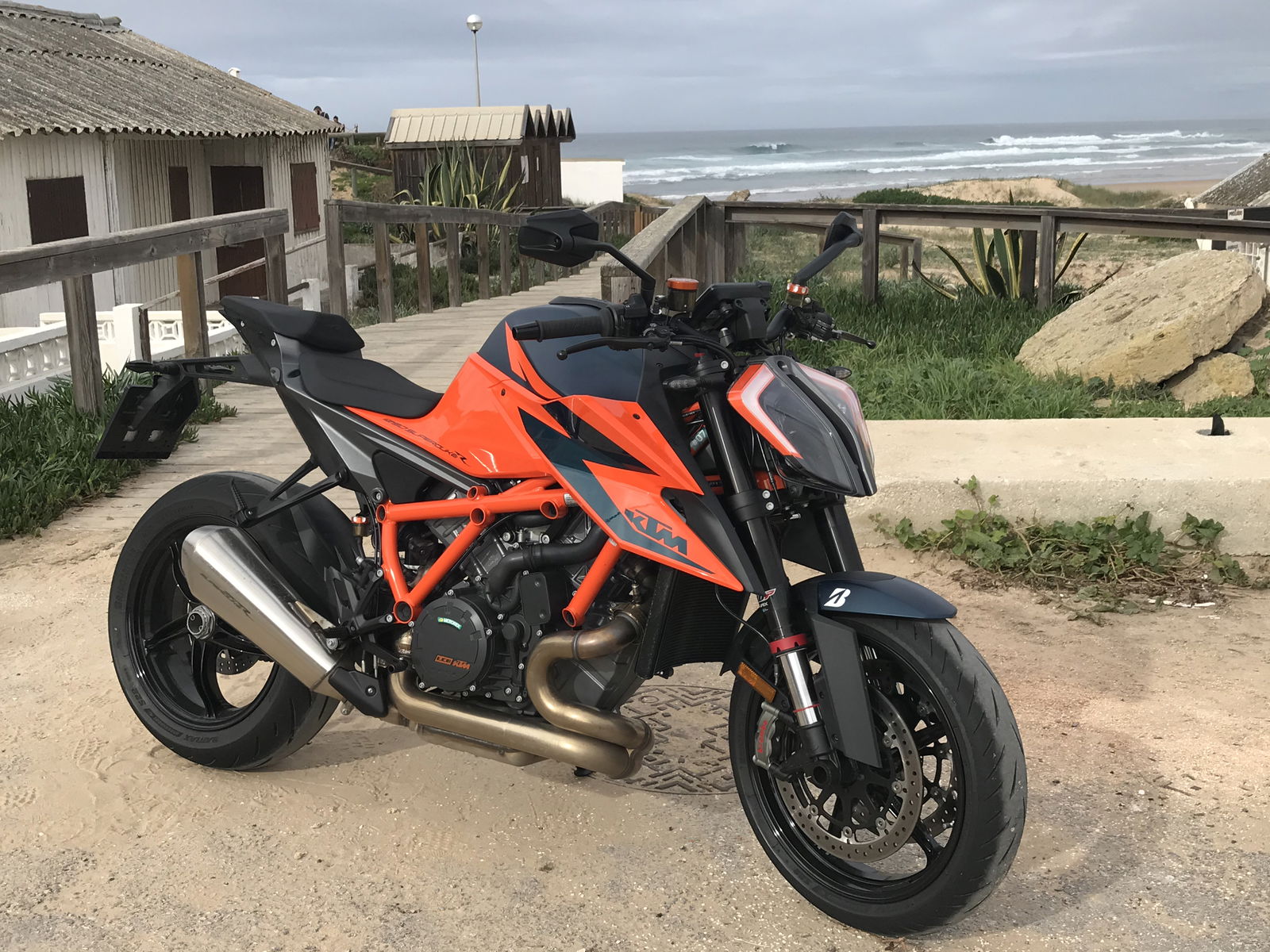
Pricing, colours and equipment
There’s only one version of the 1290 Super Duke R, and it costs £15,699 in either orange or black. But as usual things aren’t quite as simple as that, because that price doesn’t include the gearbox quick-shifter (£349.28) or optional Track Pack (£305.56) that allows you to disable the anti-wheelie and adjust traction control levels through nine levels.
Both seem almost obligatory in this class (a shifter is standard fitment on the 790 Duke, after all…) and take the price to just over £16,350. That’s still less than the Tuono Factory and Streetfighter V4, but more than the base-model Aprilia and other hyper-naked rivals. At least you do get keyless ignition and cruise control as standard.
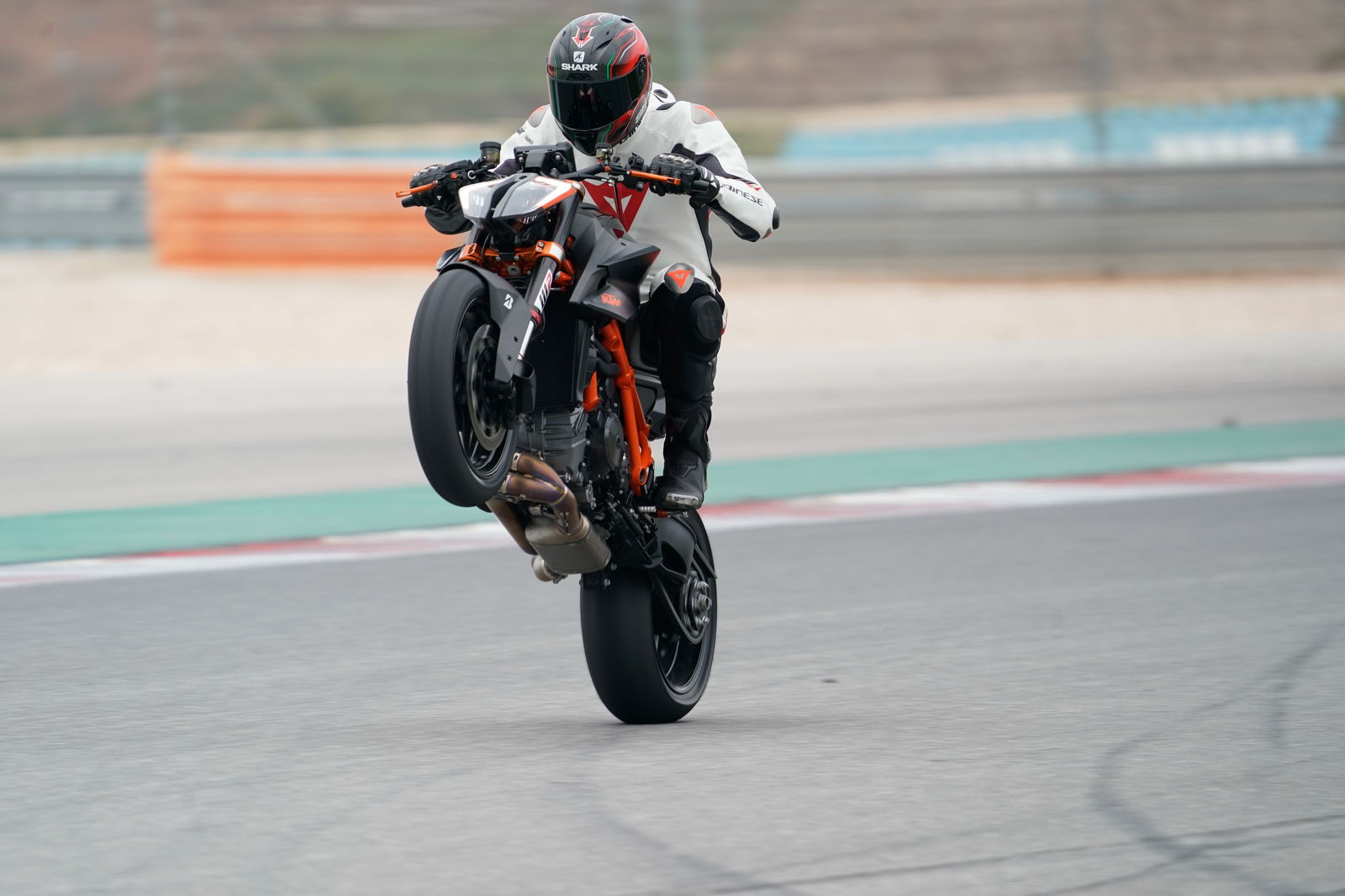
KTM 1290 Super Duke R Engine and Performance
The engine isn’t the main story of this model update but KTM have made plenty of changes. The intake system is revamped with a single intake at the centre of the distinctive headlight, instead of one on each side. This adds some ram-air effect and feeds a bigger airbox, which in turn supplies new top-mounted injectors.
Many internal parts and the crankcases are lightened, saving almost a kilo in the engine alone. The new exhaust also saves a similar amount despite having larger-diameter pipes and an additional catalyser. Hiding much of it below the engine means the silencer looks respectably trim too.
Max power output is increased by 3bhp to 177bhp at 9500rpm, but in many ways the Super Duke R’s more important figures are its near-unchanged torque peak of 140Nm, and the fact that the dohc, eight-valve lump kicks out over 100Nm from just 3500rpm.
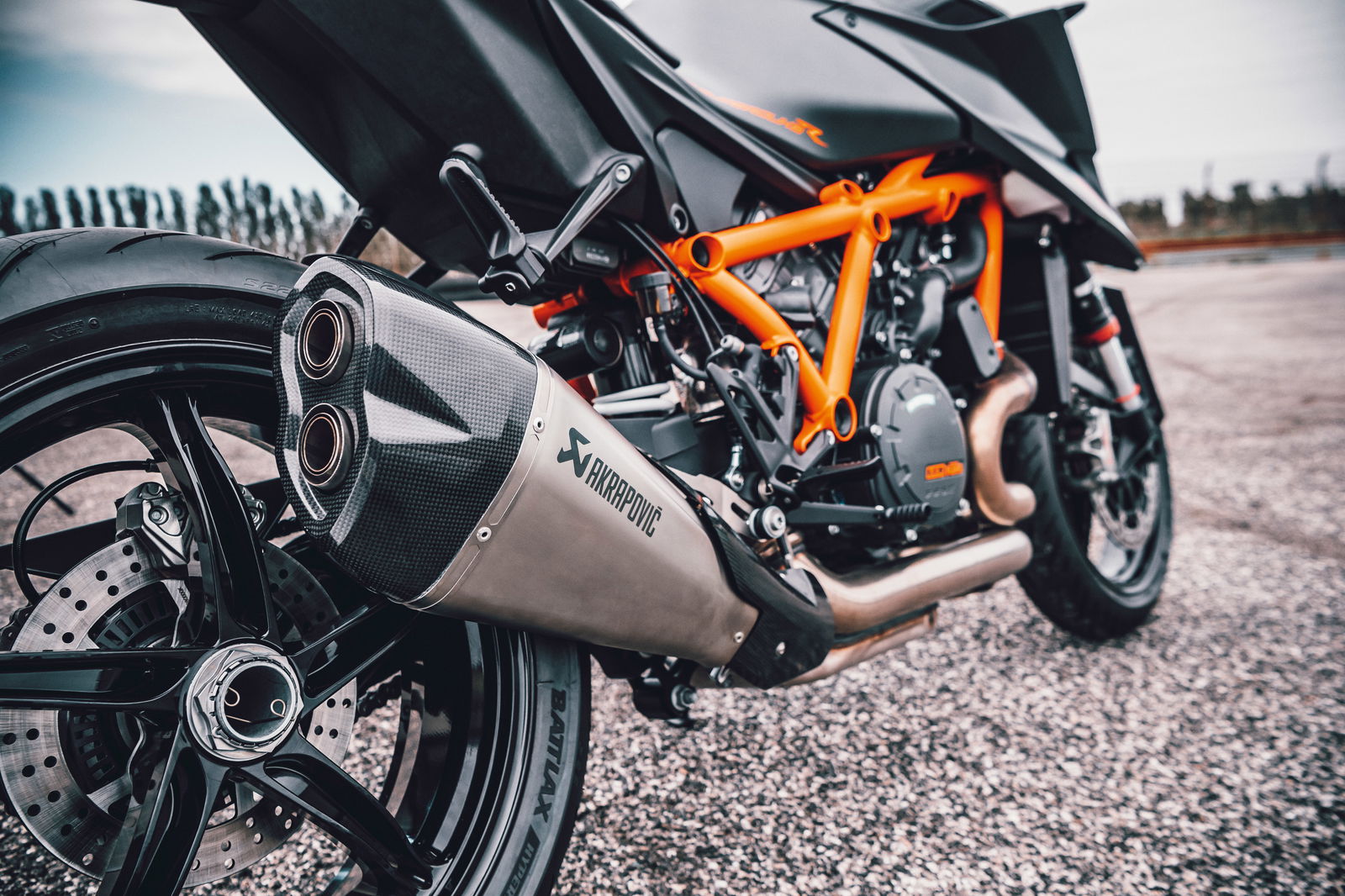
As before it’s a gloriously flexible powerplant, whichever of the three engine modes (Sport, Street and reduced-output Rain) is selected. A tweak of the throttle sends the bike leaping forward with a muted growl from the silencer, yet the response is as refined as it’s strong, and even very low rev running is smooth and civilised.
On those near-deserted Algarve roads that made the Super Duke R wonderfully exhilarating and effortlessly rapid. KTM’s lead rider wasn’t hanging about, and I could tip the bike into blind turns in pursuit, knowing that even from 5000rpm or below it would rocket out again, responding immaculately to the throttle and revving smoothly and hard while I hung on tight and flicked though the revised gearbox with the aid of the flawless shifter.
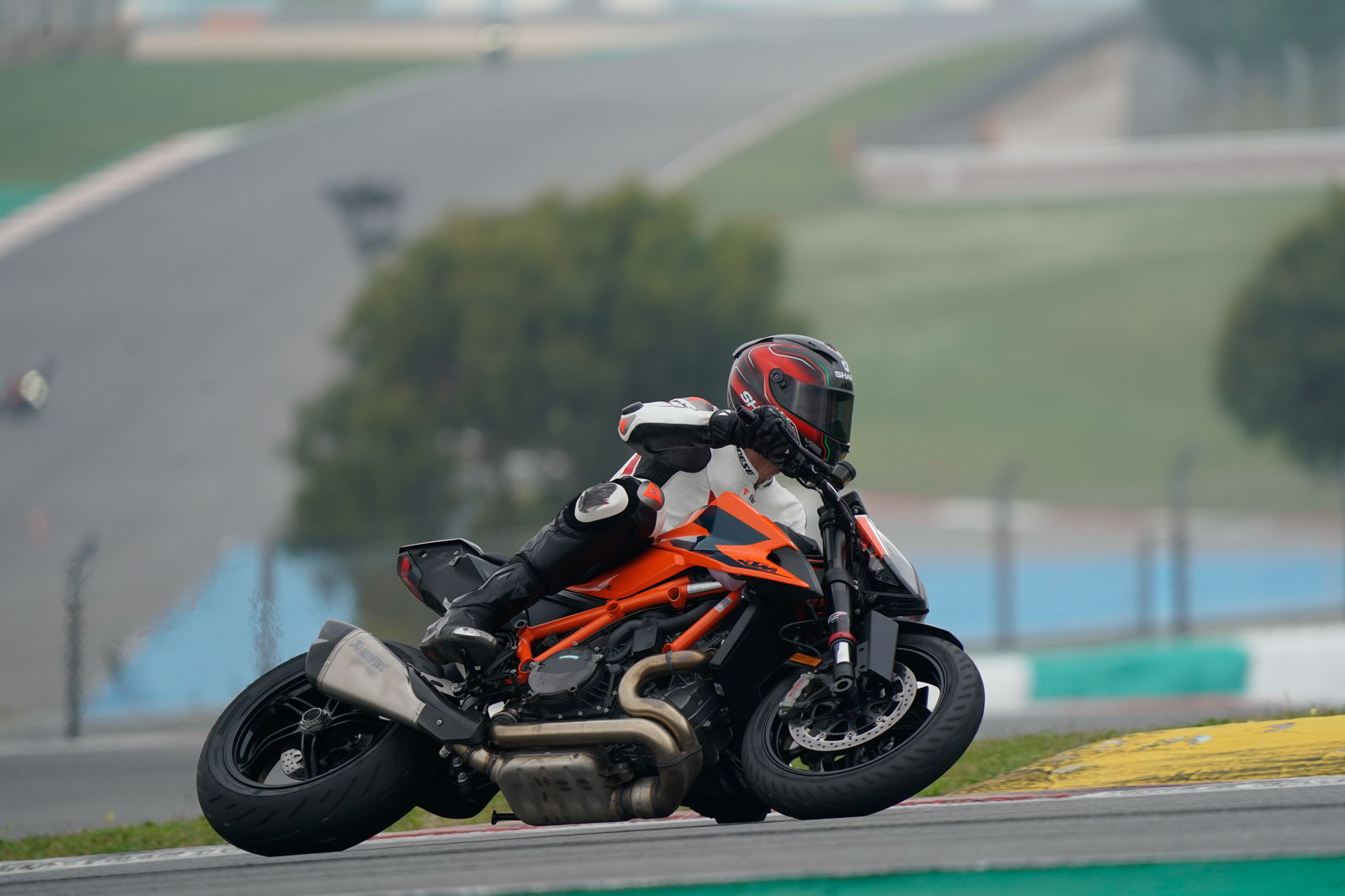
What it wouldn’t have done, without the optional Track Pack fitted, was pull a wheelie. Thankfully the launch bikes were kitted out with that and a variety of other Power Parts including an Akro slip-on silencer (which costs £1137).
That engine flexibility was also handy on the Portimao track, where the bike was happy to take most turns a gear higher than I might have expected and fired out of the Turn One right-hander in fourth where most bikes would require another downshift. It was seriously motoring just before that, too – indicating 170mph in top while I chinned the tank trying to prevent my head from being removed from my shoulders by the wind.
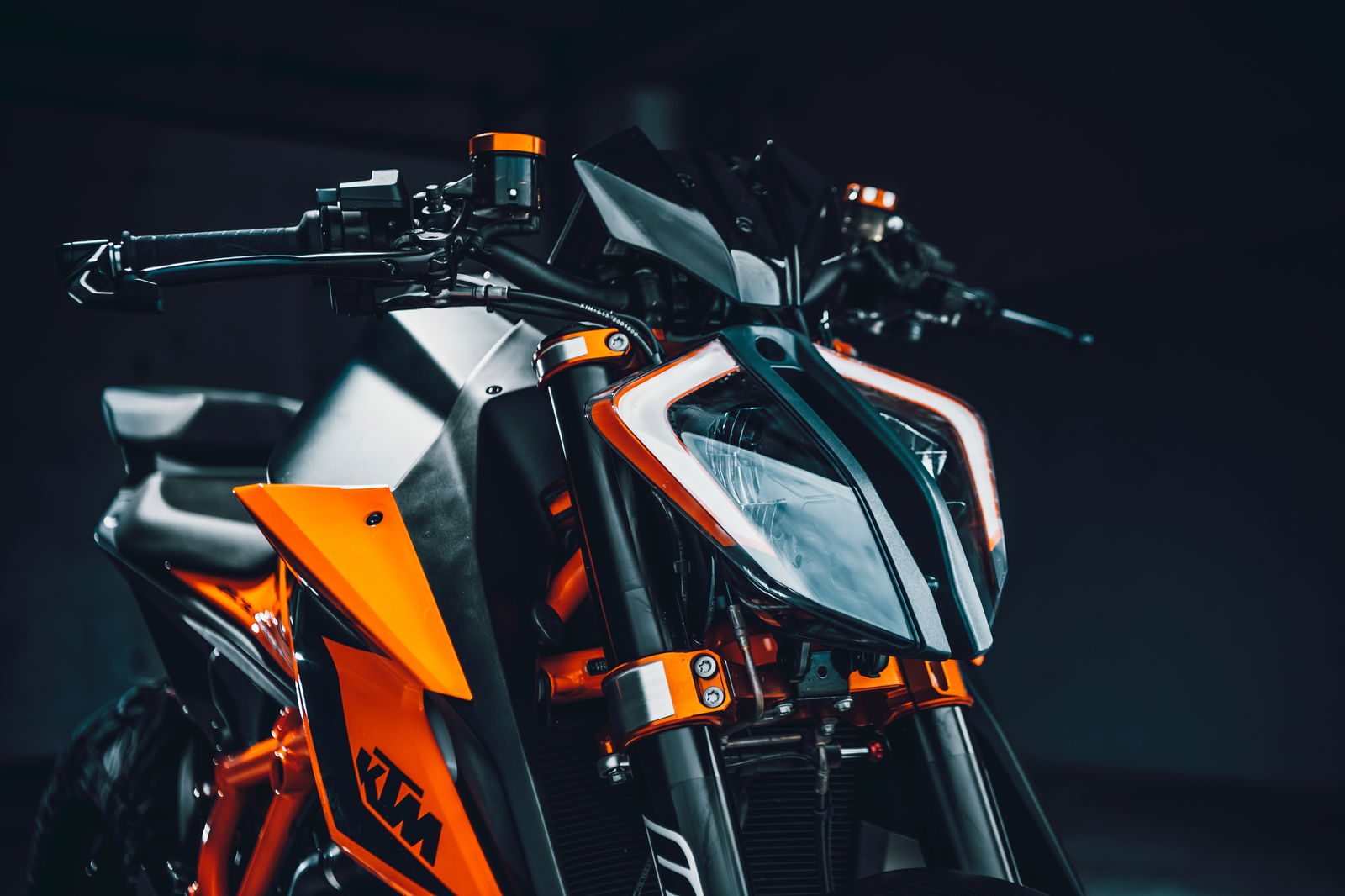
Styling and ergonomics
Wind pressure might become an issue at times because the Super Duke provides very little protection even by naked bike standards. Some launch bikes were fitted with an accessory screen for the road ride but even this barely covers the instrument panel. A gym membership and heated vest will be useful extras for UK riders who don’t stick to very short trips.
This bike’s refreshed styling is even more sharply aggressive than before and intended to add some downforce. The riding position is slightly sportier, with the handlebar set lower and further forward. That was helpful on track and also seemed a good compromise on the street, still giving a comfortably upright position for slower-speed riding.
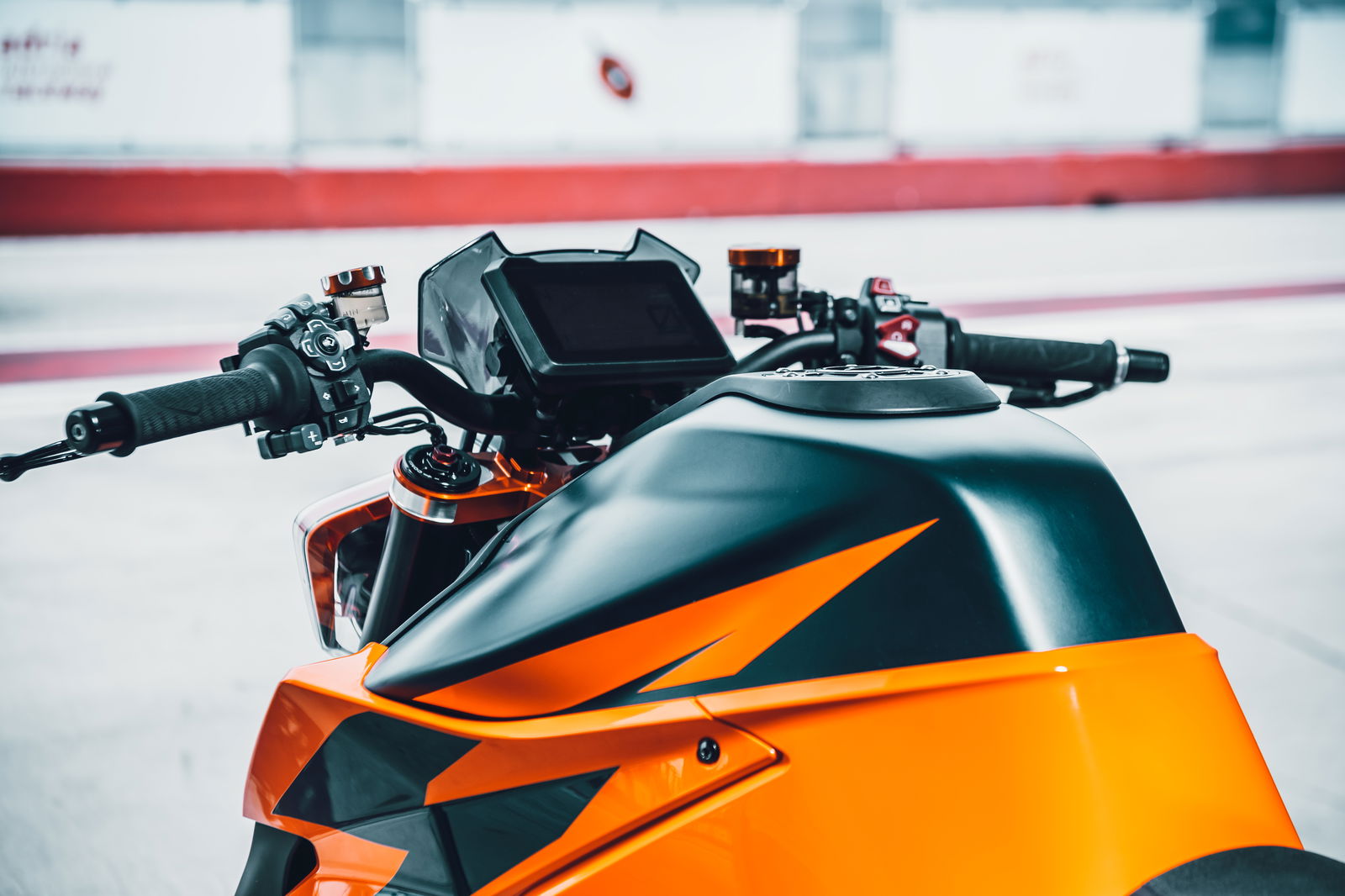
There’s some adjustability in the handlebar, and plenty of other neat touches. The riding position is fairly roomy, and the footrests can be adjusted. You can even fine-tune the gearlever throw, and quickly reverse the shift pattern.
Less helpfully, the bigger airbox cuts fuel capacity from 18 to 16 litres. At least that should still mean a range well over 100 miles, given that the KTM was averaging an easily bettered near-40mpg despite plenty of throttle abuse.
The TFT screen is new and improved, part of an electronics update that includes revamped and more easily used switchgear plus latest-generation Bosch traction control and cornering ABS. It all worked seamlessly although it’s disappointing that, as before, you need the optional Track Pack to be able to disable the anti-wheelie, at least without turning off traction control too.
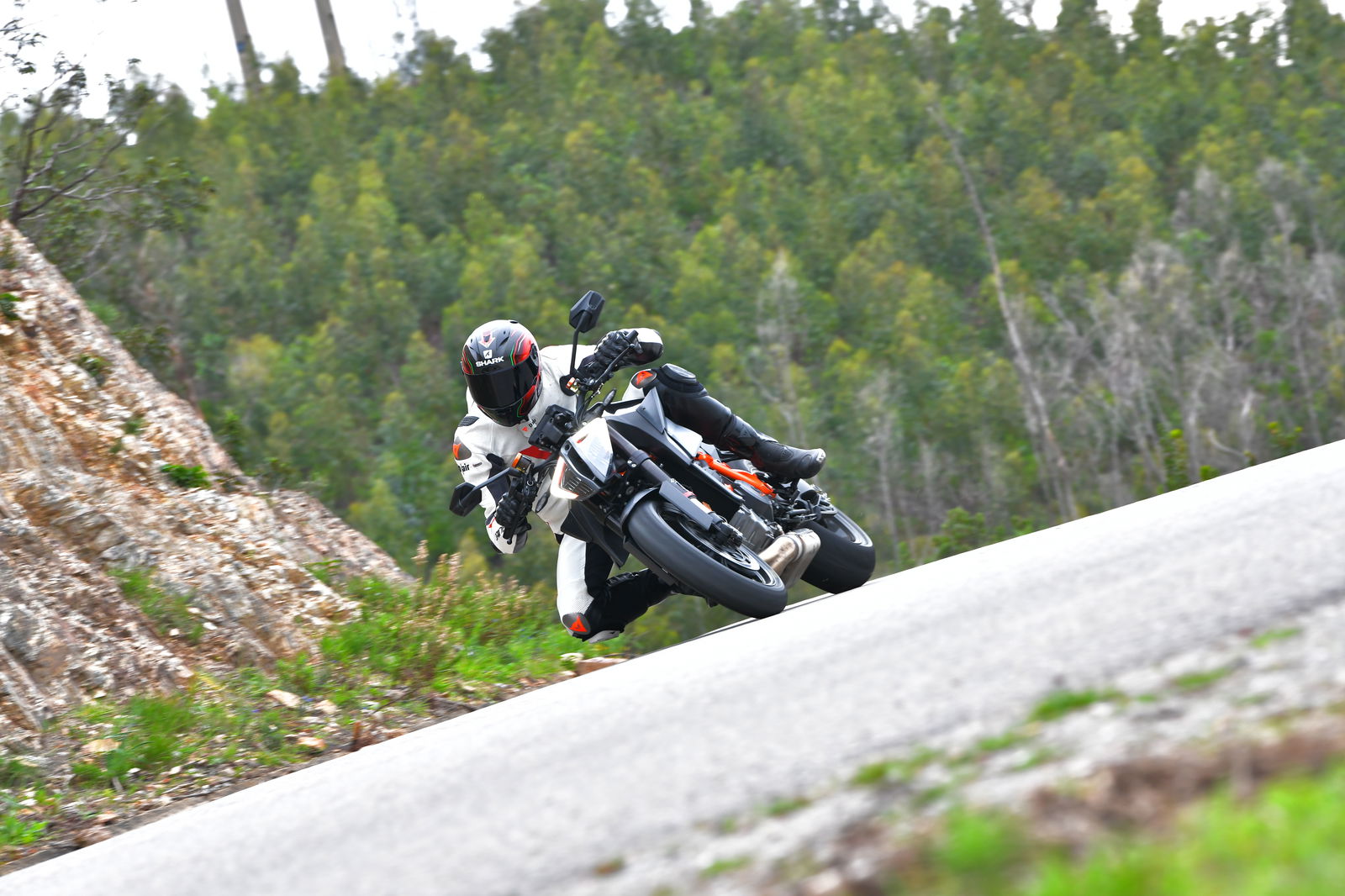
How does the KTM 1290 Super Duke R handle?
The Super Duke R’s chassis changes far more than a first glance at the retained layout of tubular steel frame and aluminium swing-arm might suggest. That frame features larger-diameter tubes and uses the engine as a stressed member for the first time, which results in a whopping 200 per cent increase in torsional rigidity along with a 2kg weight saving.
A rear subframe of cast aluminium and carbon-fibre replaces the old steel tubes, saving another 1.5kg. The engine is held higher in the frame, which KTM say aids handling and gives a 5mm higher pivot for the single-sided swing-arm, which is redesigned and 15 per cent stiffer.
Rear suspension action is also completely reworked, now incorporating a rising-rate linkage below the WP shock. This allows the remote-reservoir unit to have a longer action, while reducing rear wheel travel from 156 to 140mm. Up front, the 48mm WP Apex forks give an unchanged 125mm while now allowing adjustment of preload as well as damping.
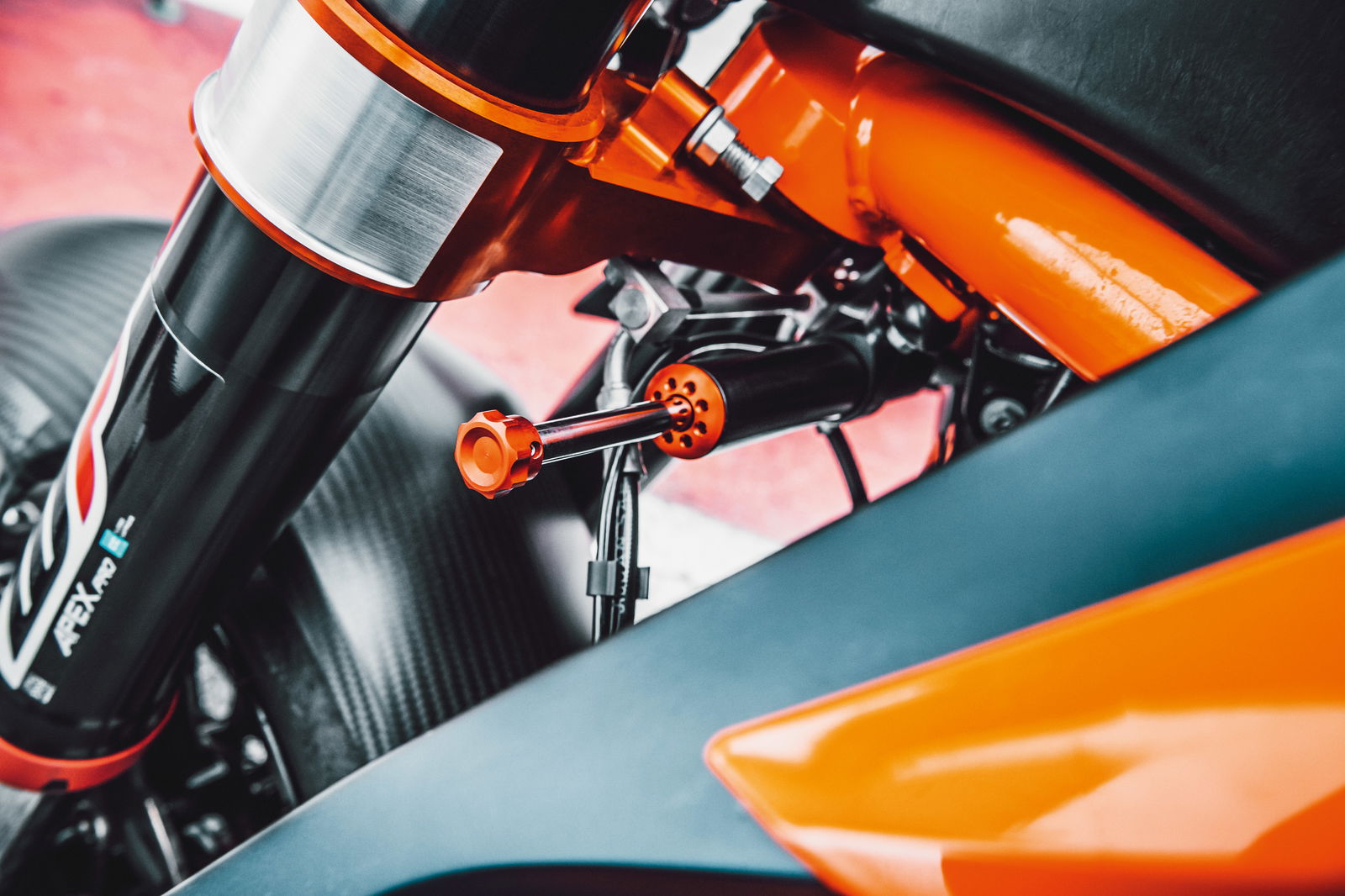
Steering geometry is also tweaked, and wheelbase increased by 15mm to 1497mm, but it’s the rear-end changes that make most difference. The Super Duke always handled fine on the road and it’s now better still, feeling a little more sporty and composed, and steering with impeccable accuracy even when its pilot is putting plenty of body weight through the bars.
A couple of times, when I hit a big bump at speed and felt a jolt through the seat, I wondered whether the outgoing model would have soaked it up slightly better. But I’m not sure about that, and most of the time the rider quality was fine, and the seat felt impressively comfortable. (A semi-active option would be nice, but at least the forks feature handy plastic damping knobs at the top of each leg, and the shock has a remote preload adjuster.)
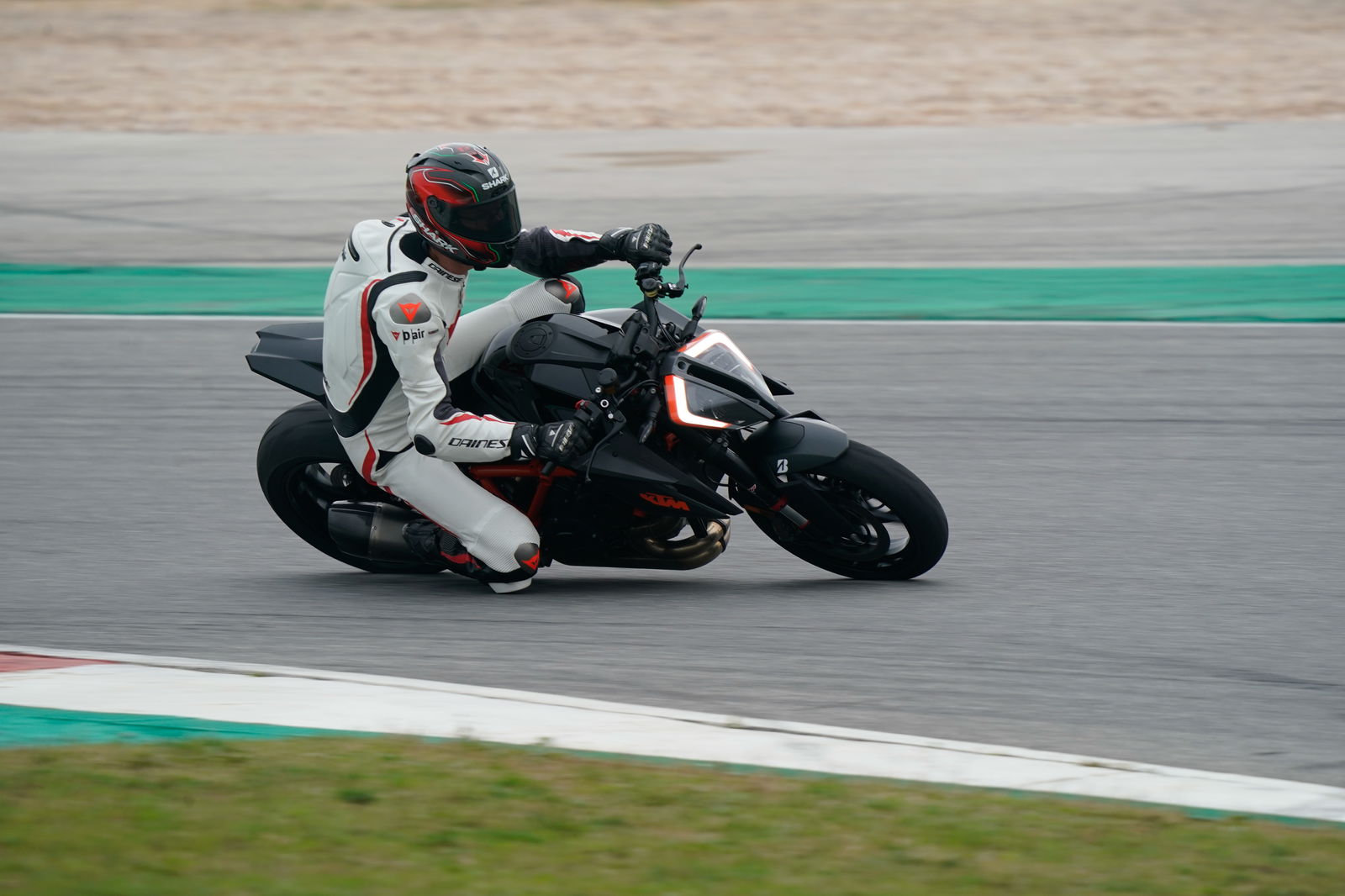
Is the KTM 1290 Super Duke R still a great track day choice?
On track the new Super Duke’s advantage very quickly became clear. The previous model worked okay but was held back by all that rear suspension travel, tending to squat under power and feel a bit loose and wobbly, especially with a tall or heavy rider on board.
One lap of Portimao was all it took to confirm that this latest Super Duke has no such issues. Entering turns, and when braking with the full force of Brembo’s potent Stylema calipers, its chassis felt subtly more controlled, aided by that stiffer frame and probably also by the revised geometry and the WP forks’ revised cartridge design.
And on corner exits the KTM was transformed. It no longer sat down under acceleration but stayed taut – holding its line much better, transmitting all that torque to its sticky, 200-section Bridgestone S22 much more efficiently, and generally making the bike both quicker and more enjoyable to ride.
We like
- Fantastically grunty and characterful V-twin engine
- Improved handling, especially on track
- Costs less than Tuono Factory and Streetfighter V4
We don’t like
- Naked even by naked-bike standards
- Fuel capacity also limits range
- Wheelies and shifter should come as standard
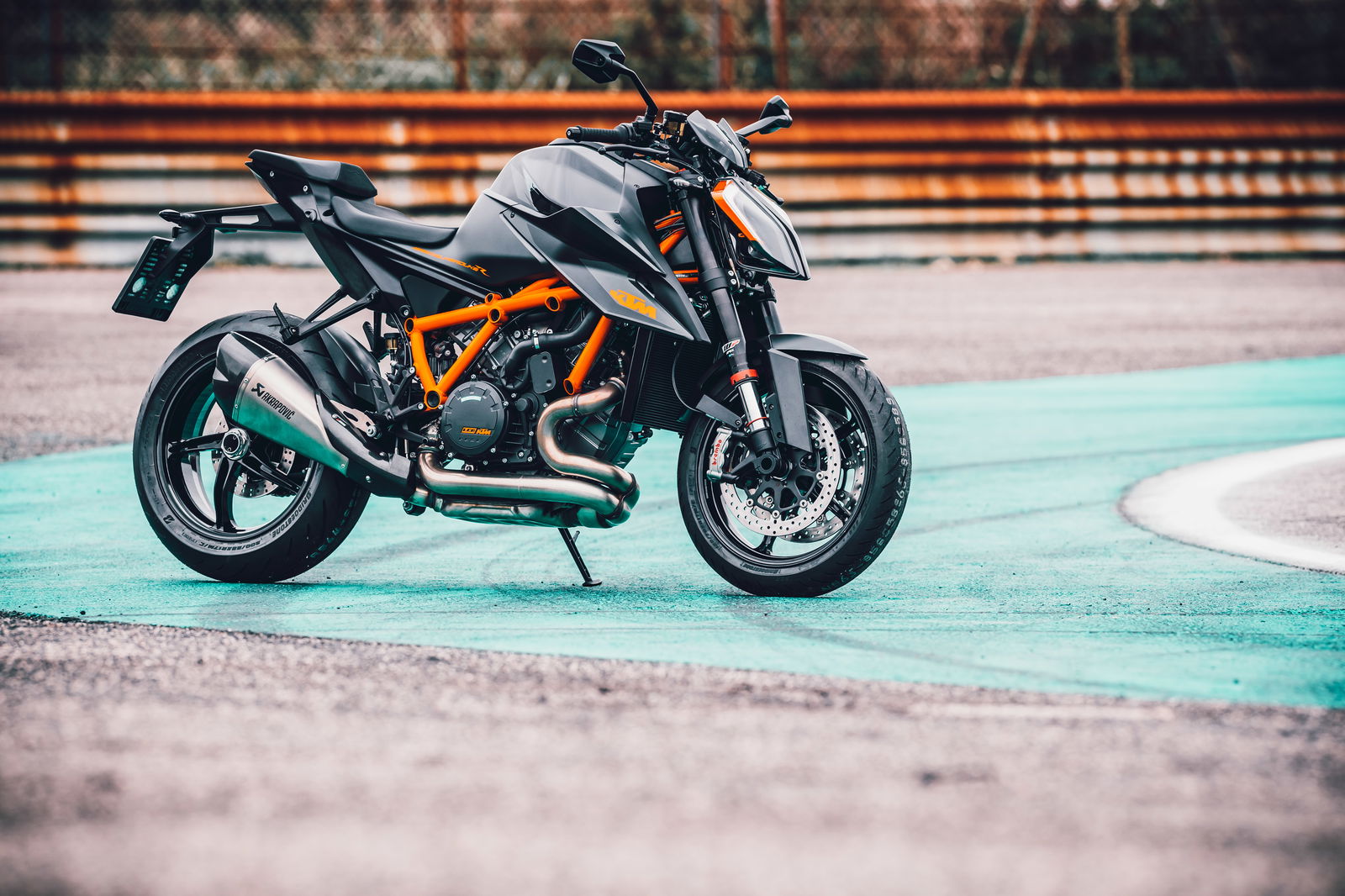
KTM 1290 Super Duke R (2020) verdict
With its knife-sharp styling and unashamedly exposed riding position, the 1290 Super Duke R has always been a hardcore hyper-naked bruiser whose ultra-torquey engine fully deserves that “Beast” nickname, provided it’s not held back by the electronics. But until now its chassis couldn’t quite keep up, especially on a racetrack where it was too soft and vague.
That changes with this latest update, which is notably stiffer and better controlled, giving KTM’s V-twin a timely boost with which to take on its increasing number of feisty four-cylinder rivals. Whether it’s the best of the hyper-naked bunch remains to be seen.
What’s for sure is that the revitalised 1290 Super Duke R is bringing a seriously sharp knife to the fight.
KTM 1290 Super Duke R (2020) specs
ENGINE | |
Type | V-twin, 75-degree |
Displacement | 1301cc |
Bore x stroke | 108mm x 71mm |
Maximum power | 177bhp @ 9,500 rpm |
Maximum torque | 103 ft/lbs @ 8000 rpm |
Compression ratio | 13.5:1 |
Valvetrain | DOHC, 4vpc |
Fueling | Keihin EFI; 56mm throttle bodies |
Cooling | Liquid |
Transmission | 6-speed , optional bi-directional quickshifter |
Final drive | Chain |
CHASSIS | |
Frame | Tubular steel, aluminum/carbon rear subframe |
Front suspension | WP APEX 48mm telescopic fork w/ adjustable preload, compression & rebound damping; 125mm travel |
Rear suspension | Single WP shock w/ adjustable preload, compression & rebound damping; 140mm travel |
Wheels | Cast aluminum |
Front tire | 120/70 x 17 |
Rear tire | 200/55 x 17 |
Front brakes | 320mm discs w/ radially mounted 4-piston Brembo Stylema calipers |
Rear brake | 240mm disc w/ 2-piston Brembo caliper |
DIMENSIONS | |
Wheelbase | 1497mm |
Rake | 25.2 degrees |
Trail | 106mm |
Seat height | 835mm |
Fuel capacity | 16 litres |
Wet weight | 198kg (without fuel) |
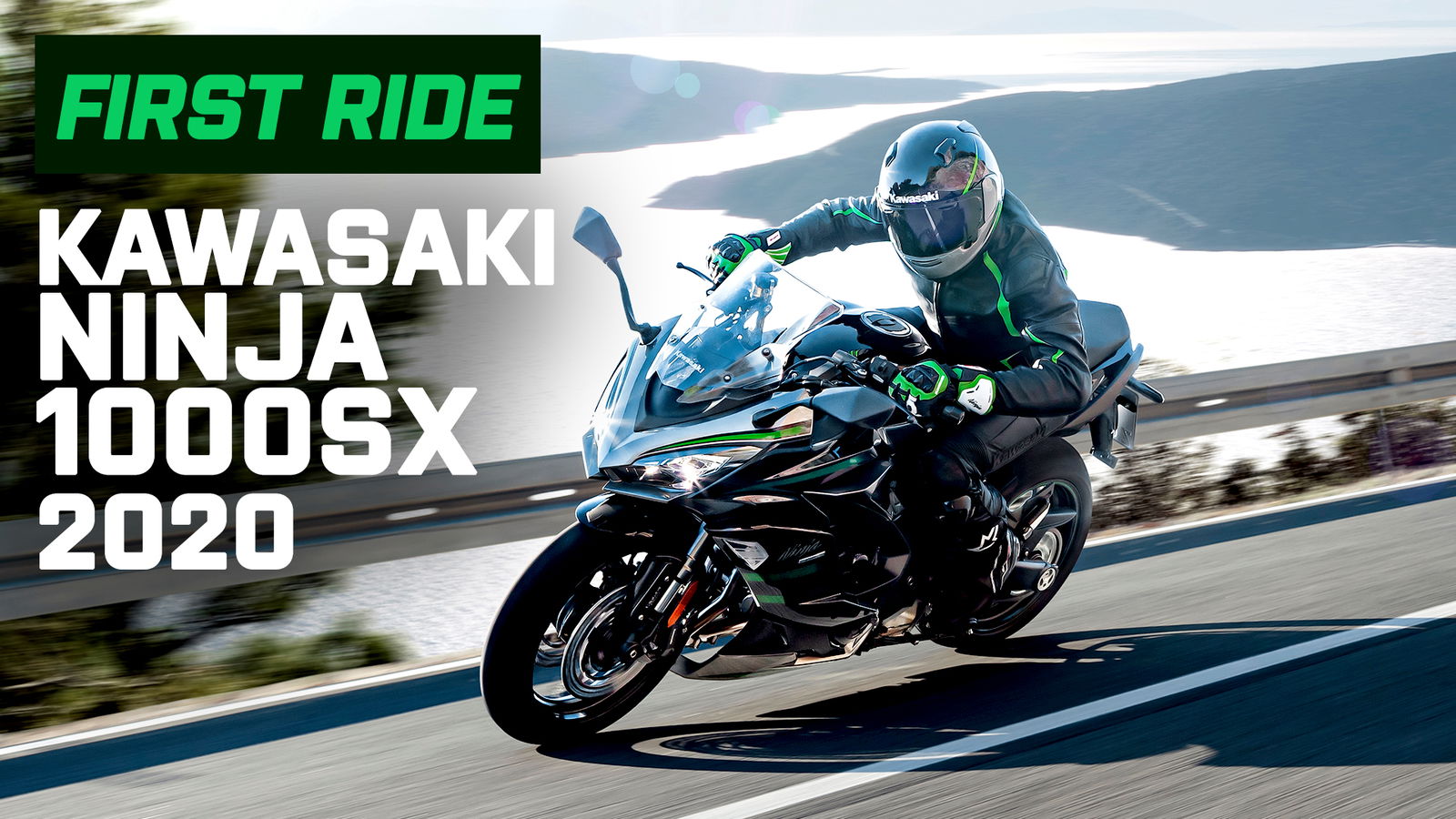
.jpg?width=1600)

